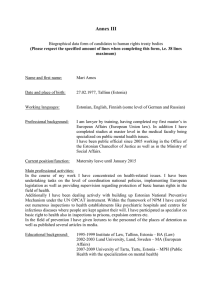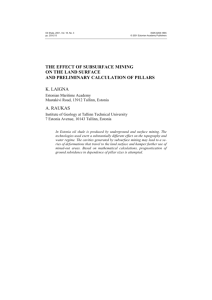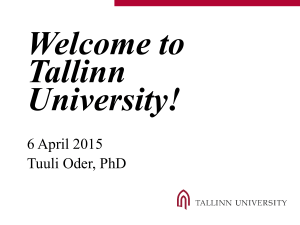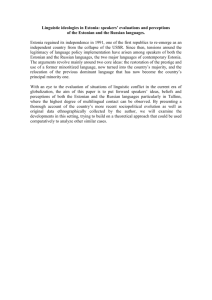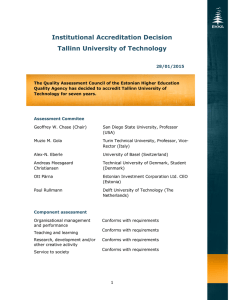here - Research In Estonia
advertisement
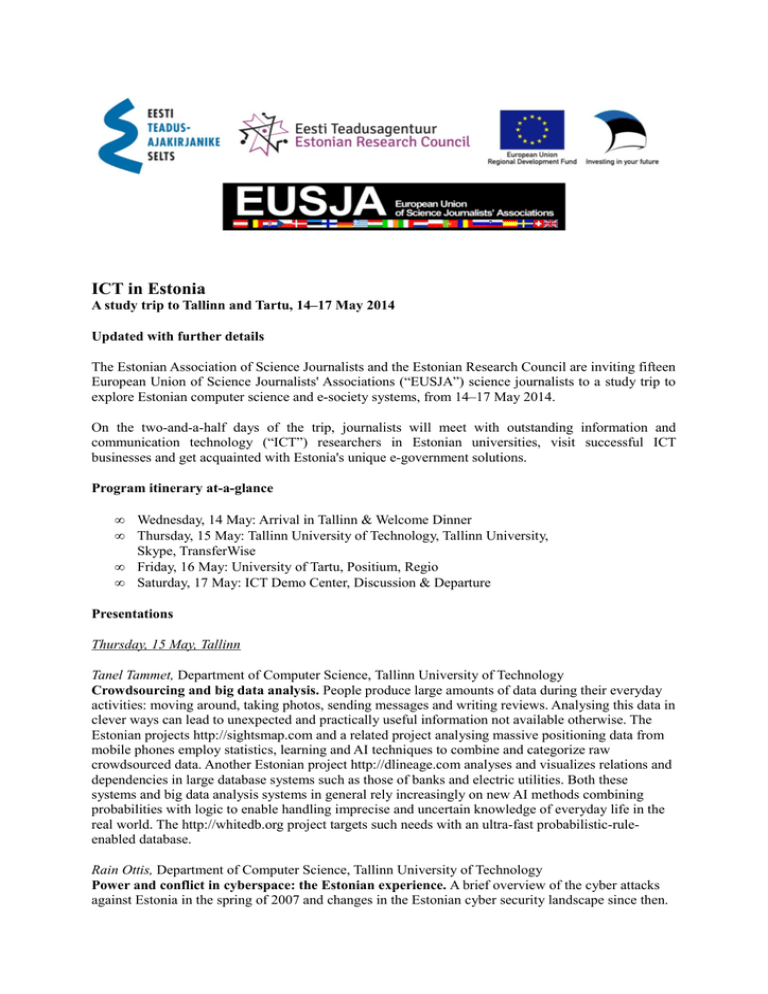
ICT in Estonia A study trip to Tallinn and Tartu, 14–17 May 2014 Updated with further details The Estonian Association of Science Journalists and the Estonian Research Council are inviting fifteen European Union of Science Journalists' Associations (“EUSJA”) science journalists to a study trip to explore Estonian computer science and e-society systems, from 14–17 May 2014. On the two-and-a-half days of the trip, journalists will meet with outstanding information and communication technology (“ICT”) researchers in Estonian universities, visit successful ICT businesses and get acquainted with Estonia's unique e-government solutions. Program itinerary at-a-glance • • • • Wednesday, 14 May: Arrival in Tallinn & Welcome Dinner Thursday, 15 May: Tallinn University of Technology, Tallinn University, Skype, TransferWise Friday, 16 May: University of Tartu, Positium, Regio Saturday, 17 May: ICT Demo Center, Discussion & Departure Presentations Thursday, 15 May, Tallinn Tanel Tammet, Department of Computer Science, Tallinn University of Technology Crowdsourcing and big data analysis. People produce large amounts of data during their everyday activities: moving around, taking photos, sending messages and writing reviews. Analysing this data in clever ways can lead to unexpected and practically useful information not available otherwise. The Estonian projects http://sightsmap.com and a related project analysing massive positioning data from mobile phones employ statistics, learning and AI techniques to combine and categorize raw crowdsourced data. Another Estonian project http://dlineage.com analyses and visualizes relations and dependencies in large database systems such as those of banks and electric utilities. Both these systems and big data analysis systems in general rely increasingly on new AI methods combining probabilities with logic to enable handling imprecise and uncertain knowledge of everyday life in the real world. The http://whitedb.org project targets such needs with an ultra-fast probabilistic-ruleenabled database. Rain Ottis, Department of Computer Science, Tallinn University of Technology Power and conflict in cyberspace: the Estonian experience. A brief overview of the cyber attacks against Estonia in the spring of 2007 and changes in the Estonian cyber security landscape since then. Einar Meister, Institute of Cybernetics, Tallinn University of Technology Estonian speech technology. Speech recognition and synthesis have reached an impressive level for major languages such as English. But Einar Meister and his team are busy helping to get speech technologies for Estonian, a language of just a million speakers, up to speed. Tobias Ley, Institute of Informatics, Tallinn University Social semantic technologies for scaling informal workplace learning. Professionals predominantly learn at the workplace in the context of their work tasks. Tobias Ley and his team are looking for ways to use social semantic and mobile technologies to capture, make sense and share experiences that people make during everyday work. Dan Bogdanov, Cybernetica AS Sharemind. The ingenious data analysis system, Sharemind, performs computations on confidential data without compromising privacy. It does not even see the data that it processes. So it can, for example, warn satellite owners about orbital collision risks without revealing the exact trajectories. Skype Developed in Estonia and now owned by Microsoft, Skype allows peer-to-peer communication by voice, video and instant messaging over the Internet. In 2013, Skype users spent more than 400,000 years, cumulatively, on international Skype-to-Skype calls. TransferWise Created by some of the same people who built Skype, this company is poised to spark a financial revolution that waves goodbye to the unfair exchange rates of the old banking system by offering a clever new way to send money abroad. Friday, 16 May, Tartu Jaak Vilo. Institute of Computer Science, University of Tartu Big data in small Estonia. Estonia has seen growth in data science – from biobanking the DNA to mobile positioning; from business model discovery from logs to e-health or marine data mining. Activities range from academic excellence to startups. Jaak Vilo will cover some of the activities in this area. Reedik Mägi, Estonian Genome Centre, University of Tartu Perspectives of genomics. An account of the increasingly IT-intensive science of genomics in Estonia and elsewhere. Krista Fischer, Estonian Genome Centre, University of Tartu From genomic research to personalized medicine. Looking for ways to compute and communicate individual genetic risk. Kristjan Vassil. Institute of Government and Politics, University of Tartu The impact of internet voting on political participation. The Estonian e-voting experience offers an unprecedented resource for political scientists to study online voting behaviour, e.g. the effect of online voting on voter turnout. Rein Ahas, Department of Geography, University of Tartu Erki Saluveer, Positium LBS Using mobile positioning data in planning and public administration. The ubiquitous mobile device, characteristic of the information age, is used by scientists to get valuable information on the movement of people, helping to make sense of social patterns. Human geographer Rein Ahas's team has created a positioning method that yields usable data, yet respects privacy. Regio Ltd (Reach-U) Demograft. Regio created the first live positioning service in the world: in cooperation with Ericsson, it started developing the E-112 solution for locating emergency callers in 1999. Today, they are one of the largest providers of location-based services to mobile operators globally. On the visit they will demonstrate the location analytics platform Demograft. Saturday, 17 May, Tallinn ICT Demo Center. This non-profit organisation showcases the nation's ICT solutions (the electronic ID and digital signature, e-Governance, e-Business, e-Healthcare, e-School, etc.) all in one facility and provides visitors with hands-on examples of what they are and how they work. Discussion. Another opportunity to freely discuss the outlooks and challenges of Estonian egovernance solutions etc with specialists, activists and leaders. Facts and comments about e-Estonia X-Road is the backbone of e-Estonia. It is the invisible yet crucial environment that allows the nation’s various e-service databases, both in the public and private sector, to link up and operate in harmony. In December, Estonia agreed with Finland to implement the X-Road source code as a foundation for the Finnish national data system. Estonia essentially functions as a global cyber power. – Jared Cohen, Director of Google Ideas Estonia may represent the future of governments, at least in the Western world. – Eric Schmidt, Executive Chairman of Google In 2005, Estonia became the first country in the world to have country-wide elections where citizens could cast binding votes over the internet. Since then, a total of six e-elections have been held, with the share of e-votes reaching 24 per cent of the total cast in the general elections of 2011. See more on www.e-estonia.com Estonia is a country that holds a leading position at the global level in information technology and cyber security. – Shinzo Abe, Prime Minister of Japan http://bit.ly/1fXpMtp http://bit.ly/1pvIQUX Practical information Accommodation for three nights (14–17 May), meals, and transportation during the trip will be covered by the organisers. However, participants are responsible for their travel expenses to and from Tallinn, including airport transfer. You will stay at the PK Ilmarine hotel (www.pkhotel.eu, Põhja pst 21b, 10414 Tallinn), just a few minutes walk from the Old Town. If you would like to extend your stay, we can help you book your room for an extra night (or two). Please make sure to arrive at the hotel lobby at 6:30 p.m. Estonian Summer Time (CEST+1) on Wednesday, 14 May, to set off for the Welcome Dinner. The programme will end at 2 p.m. on Saturday, 17 May. Applications Please send applications via national associations by, at the latest, April 7, 2014 to Priit Ennet (priit.ennet@gmail.com). The application should identify the journal or newspaper you will represent during the study trip. For any inquiries please contact: Priit Ennet Science Journalist President of the Estonian Association of Science Journalists priit.ennet@gmail.com Phone 00372 5145608 Karin Patune Marketing Officer Estonian Research Council karin.patune@etag.ee Phone 00372 56640009 The study trip is funded by the European Union Regional Development Fund.
